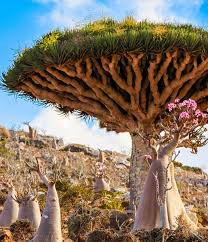
SANAA, July 19 (Saba) - The island of Socotra is simply too important to multiple international players that are not willing to let it easily slip outside their sphere of influence.
Yemen's five-year-long war has not devastated Socotra, as it has elsewhere in the country. The island is relatively peaceful - 220 miles away from mainland Yemen, and is a UNESCO-protected site. It's often called the Galapagos of the Indian Ocean, and hosts around 800 rare animal and plant species.
The Socotra archipelago occupies a critical strategic position en route to Bab el-Mandeb, the most vulnerable chokepoint on this key energy transit corridor. Socotra's central location also makes it an ideal launch point for interdicting pirates and smugglers.
For years, international and regional powers have scrambled to establish bases in the Island. Socotra, like the rest of the region, has become a hotbed of geopolitical competition. Somalia, Eritrea, India, Qatar, and the UAE have all attempted to gain a foothold on the island.
Following the Emirati armored carriers arrived on the island, Hadi's government which that based in Riyadh accused the UAE of taking "unjustified military action" and submitted a complaint to the UN, which described the Emirati action as a "violation of Yemen's sovereignty." Although the UAE announced its withdrawal from Yemen , it still maintains its sphere of influence through its support for the STC, a situation that complicates political dynamics on the island.
Saudi Arabia acutely aware of the geopolitical conflicts, which it has sought to de-escalate through the November 2019 Riyadh Agreement between the Hadi government and the STC. However, in a geopolitical struggle that aims to weaken Saudi Arabia’s economy and military position, it is more than likely that the Saudis will side with their long-term ally, the UAE. This is part of the reason why they have maintained a favorable tone toward the STC, despite Hadi’s opposition.
Ultimately, at the request of the president-in-exile, Riyadh dispatched its own forces to the island, thereby symbolically upholding Hadi's claim to stewardship over Socotra as the legitimate government . The move was also a victory for the STC, whose forces are entrenched on the island and will remain there. But while the Hadi government's dependence on Riyadh gave the Emiratis the upper hand, it is unlikely that the matter is settled. Socotra is still a prize.
The UAE is seeking greater influence in Socotra, having built a military base there, installing communications networks, and carrying out other development projects - similar to its policies elsewhere in Yemen such as Aden and Mukalla.
It has also tried to win support there by offering healthcare and work permits in Abu Dhabi to Socotri islanders, while failing to do the same for other Yemenis.
Moreover, many Socotrans were granted Emirati citizenship in the past couple of years. This move could sway residents of the island, to become completely aligned with the UAE.
The increasing naturalization of Socotrans and lack of services on the island present challenges that will pose a significant threat to Yemen’s future.
Prior to its increasing military escalations in Socotra, the UAE previously focused on aid projects in the country, and Gargash insisted its presence is "purely humanitarian". Yet Abu Dhabi always uses the pretext of humanitarianism to seek greater regional influence elsewhere, such as Libya, Sudan, and East Africa.
Following protests from civilians and political figures there, Saudi Arabia negotiated a deal for a partial UAE withdrawal . Yet Abu Dhabi retained many of its links, which it is now trying to consolidate and conceivably expand, alongside its pursuits elsewhere in Yemen.
Yemeni officials have since condemned unrelenting Emirati attempts to control Socotra.
Yet ultimately it is still Yemen that will suffer as a result if these policies continue. These Emirati-backed groups and militias risk prolonging instability, while making peace a further distant prospect.
Mona Zaid